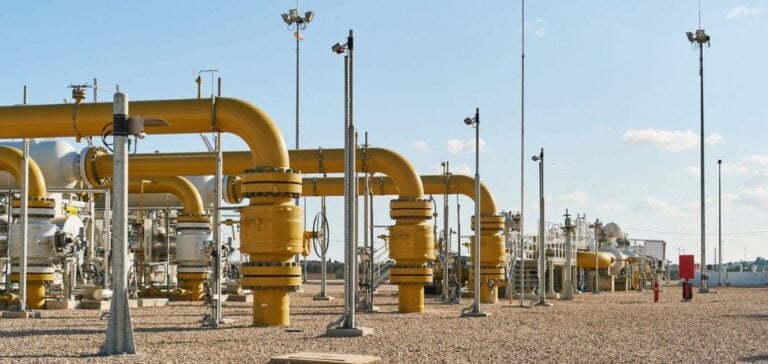The European Union aims to ban Russian fuel imports by 2027. However, almost half of Russia’s pipeline gas supplies to Europe and Moldova still pass through Ukraine, totaling 13.7 billion cubic meters (Bcm) in 2023. While the EU is discussing a possible future transit agreement with Azerbaijan, the current five-year gas transit agreement between Russia and Ukraine is due to expire at the end of 2024, raising concerns about the future of these gas volumes.
Impact on dependent European countries
Slovakia, Austria and Moldavia are the European nations most dependent on transit volumes, importing around 3.2 Bcm, 5.7 Bcm and 2.0 Bcm, respectively, in 2023. By 2022, Russian gas transiting through Ukraine was supplying EU countries via entry points in Slovakia and Moldavia. Moldova is adjusting its supply while having agreed with Ukraine on a continuous flow of Russian gas until the end of 2025, mainly destined for the pro-Russian separatist region of Transnistria. In 2023, the country imported 74% of its gas via Ukraine and, for the first time, received gas from Romania and the south via reverse flows through the trans-Balkan pipeline.
Consequences of flow interruptions
Stopping Russian gas flows via Ukraine would have a significant impact on countries dependent on these volumes. For example, when the transit extension expires after 2025, Moldova will have to redirect its 2 Bcm supplied via Ukraine, possibly via reverse flows from the trans-Balkan pipeline. To reach Moldova, Russian gas could use the Isaccea entry point between Romania and Ukraine, but a transit agreement for the short 25-kilometer distance through Ukraine would be required.
The trans-Balkan pipeline has been operating in reverse flow since the end of 2022, with 0.54 Bcm of gas entering Moldova via Ukraine from Romania through the Isaccea entry point in 2023. In addition, gas from the southern gas corridor in Azerbaijan, as well as from LNG import terminals in Turkey and Greece, can reach Moldova from the south. When the Russia-Ukraine transit agreement comes to an end, the only alternative supply routes for the countries of Central and Eastern Europe will be the Balkan Stream and the Horgos entry point between Serbia and Hungary.
Strategies for redirecting gas flows
Russian producer Gazprom and European importers are keen to maintain uninterrupted supplies via Ukraine, while Ukrainian officials deny any intention of renewing the agreement with Russia. Without Azerbaijan or another third party transiting gas after a swap agreement with Russia, the EU will require around 7.2 Bcm of gas from the LNG market. Terminals in Poland, Germany, Lithuania and Italy could route these volumes to the hardest-hit countries, such as Slovakia and Austria.
Rystad Energy forecasts potential changes in the 2023 gas balance for the countries concerned, assuming gas flows via Ukraine of 50% and 0% and capacity limitations at the relevant entry points. Without Russian gas, Slovakia would find itself at the end of the flow chain, requiring around 4 Bcm of gas delivered via the Lanzhot entry point from the Czech Republic. With additional regasification capacity in Poland only available in 2025, a zero-flow scenario could even result in reverse flows from Austria to Slovakia.
Austria, the largest importer of Russian gas in 2023, is reportedly looking to increase imports from Germany via the Oberkappel entry point, which is expected to operate at a maximum annual capacity of 8 Bcm. However, for Rystad Energy’s 2023 reference year, the import capacity at Oberkappel will not be sufficient to cover the import deficit of 8.53 Bcm. Without short-term capacity adjustments, gas transits to Hungary would decrease, and outflows to Italy would come to a halt. If all Russian gas flows via Ukraine ceased, Austria would have to import up to 2.5 Bcm from Italy via the Arnoldstein-Tarvisio crossing.
Challenges for Italy and Hungary
Italy has several options for replacing Russian gas pipelines, and has largely succeeded in freeing itself from Ukrainian transit. However, the country is expected to supply around 3.75 Bcm to Slovakia and Austria. These additional supplies could come from the Ravenna floating storage and regasification unit (FSRU) – 5 Bcm per year from 2025 – and 1.23 Bcm from pipeline supplies via Tunisia.
Hungary would face major challenges in the event of a complete halt to the flow of Russian gas via Ukraine. Assuming Moldova is supplied from the south, the capacity of the trans-Balkan pipeline from Romania would be fully allocated, stopping inflows from Romania. Furthermore, Austria would be unable to transit gas to Hungary, while Croatia would have no additional regasification capacity available before 2025. Hungary should rely solely on increased gas flows via the TurkStream pipeline, where the Horgos entry point should operate continuously at its maximum capacity of 9 Bcm per year. Alternatively, if Austria could procure sufficient LNG from Italy, Hungary could receive additional gas via reverse flows at the Mosonmagyarovar entry point from Austria.
The countries of Central and Eastern Europe are preparing for a possible interruption in gas transit via Ukraine, and have joined forces to create a vertical gas corridor as part of the EU CESEC initiative. On January 19 this year, a memorandum of understanding was signed in Athens involving the European Commissioner for Energy, Kadri Simson, and transmission system operators from Greece, Bulgaria, Romania, Hungary, Slovakia, Ukraine and Moldova.






















